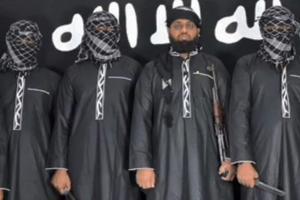The president said the information came from military intelligence and was based in part on CCTV footage recovered from the scene

The man in the centre is believed to be Zahran Hashim, who was identified by the Sri Lankan police as the leader of the Islamist National Thowheeth Jama'ath (NTJ) group, which Colombo has blamed for the attacks. Pic courtesy/AFP
Colombo: Sri Lankan Islamist extremist Zahran Hashim, said to be the top leader of an IS linked local militant group that carried out the Easter on Sunday bombings, died in the blast at the Shangri-La hotel, President Maithripala Sirisena said on Friday. Hashim, the head of the extremist group National Tawheed Jamath (NTJ), led the attack on the hotel and was accompanied by a second bomber identified as Ilham Ahmed Ibrahim.
ADVERTISEMENT
Hashim was killed during the bombings, the president told reporters. The president said the information came from military intelligence and was based in part on CCTV footage recovered from the scene. Hashim appeared in a video released by the Islamic State group after they claimed the bombings, but his whereabouts after the blasts were not immediately clear. In the video, the round-faced radical cleric was seen dressed in a black tunic headscarf and posing with a rifle.
The country's Muslim community had been warning about the firebrand cleric for years. However, it was the ISIS video that provided solid evidence about the Sri Lankan cleric's role in terrorism and Easter Sunday bombings. Hashim was believed to be 40 years old and a loner. He hailed from the east coast region of Batticaloa. He was a college drop-out and hailed from an average Muslim middle-class family. India's National Investigation Agency during its probe into an ISIS-inspired module planning to kill prominent leaders in south India had stumbled upon videos of Hashim, which was indicative of a terror attack on the Indian High Commission in Colombo.
The videos showed Hashim asking youths from Sri Lanka, Tamil Nadu and Kerala to establish an Islamic rule in the region. After further investigation which included cyber trailing of some of the accounts associated with the ISIS, India's central security agencies had shared an input with their Lankan counterparts about the churches being the likely target of the ISIS module.
Catch up on all the latest Crime, National, International and Hatke news here. Also download the new mid-day Android and iOS apps to get latest updates
 Subscribe today by clicking the link and stay updated with the latest news!" Click here!
Subscribe today by clicking the link and stay updated with the latest news!" Click here!







